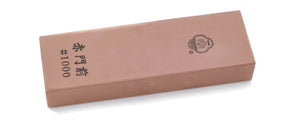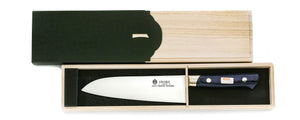Preventing Rust on Knives
An inevitable part of kitchen knife ownership is dealing with rust.
In particular, carbon steel knives rust easily if they are not taken care of. Even stainless steel, which is said to be resistant to rust, can rust if you aren't careful.
Rust will shorten the life of a good knife, so it is necessary to take good care of it. This article explains how to!
Why does rust occur?
The main culprits causing knives to rust are primarily water and oxygen. Without one of these two elements, rust is very unlikely to occur.
Let's quickly define what rust is - a chemical reaction from oxygen and water oxidizing on the surface of metal (in this case, iron.)
Iron is a metal that was originally processed for ease of human use and rusting is a natural reaction which is attempting to convert iron to it's original, natural state - iron oxide.
While rusting is a natural phenomenom, for us as humans it's a major inconvenience.
Once a knife becomes rusty, it may lose its sharpness, or even chip. Most importantly, the rust could transfer to your cut food or ingredients, which is incredibly unappealing and unhygenic.
What to do to prevent rusting
As we stated before, rust is effectively caused by the combination of water and oxygen.
Since it's impossible to remove oxygen (we need that to live, after all!) this raises the question of how to remove moisture. It's the best thing we can do for rust prevention.
However, despite this being knowledge to many people, we still get customers coming to us with rusted knives. They're confused as to why when they've been caring for them well.
While they've gone to the efforts to dry their knives, some residual moisture has still remained causing the rust.
In order to talk about how to prevent rust, we need to clarify what can happen that might cause it to start. Some of the reasons are below:
The knife is dirty
The knife being dirty is the most likely cause for rust forming.
This dirty state acts as an accelerant for rust forming. Any impurities can speed up the cause of rust.
Therefore, it's of absolute importance to clean your knives properly using a sponge and neutral detergent. We have an article all about this if you need more information!
The knife hasn't been dried enough
Even if you wipe the knife with a cloth after washing, rust may still occur if you aren't thorough.
In reality, it's challenging to completely remove moisture even with a seemingly dry cloth. Simply wiping once or twice may not eliminate all the moisture.
It's important to visually inspect the knife and ensure that all the moisture has been properly removed. Check closely and only put it away once you're absolutely certain the knife is dry - this includes the handle. If you're not sure - just dry it some more!
Storing the knife immediately after cleaning
It makes sense to store a knife immediately after cleaning it, right? However, this can actually contribute to rusting.
This is due to the potential of a slight amount of residual moisture still being on the blade that can't be easily seen afterwards. If it's in storage then, the moisture has no way to dissipate, and as a result you'll potentially see some rust.
Let your knife air-dry in a well ventilated area for about five minutes before putting it away to remove any final moisture.
In short, keep your knife clean, dry it well, then let it air-dry for a little afterwards. Then, store it correctly.
When not using your knife for a long time
Unlike everyday knives such as santoku knives which are used frequently, you may store less commonly used knives like deba or yanagiba knives at the back of your storage area. Japanese knives such as these require extra special care due to their higher carbon properties. For stainless steel knives, following the above steps is sufficient but again, make sure your knife is properly cleaned and dried before putting it away. In the case of bigger carbon steel knives, you need to be significantly more careful about moisture. Otherwise, you may wind up placing your knife in a disastrous situation when you may think you're doing the right thing. Additionally to the above, you need to perform the following steps for long-term knife storage:
Use blade oil
Oiling the blade creates a protective film on the surface, preventing oxygen from coming into contact with the knife itself. This is somewhat similar to the way chromium works on stainless steel and slightly on Blue Steel knives. Our blade oil, derived from camellia oil, is a non-drying oil, making it very suitable for long-term storage. It's what we use on our knives on display in-store to keep them in good condition, plus what we coat our carbon steel knives in when we sell them (as it can be many months until one is given as a gift, for example.) Using this oil is a brilliant way to prevent rust, plus it is relatively inexpensive to purchase. You also don't need very much of it to cover a knife. You can use a higher quality cloth (like a microfibre one,) cover it in blade oil and apply the oil to your knife blade that way in order to use only a minimal amount. As the oil is non-drying, the cloth will stay oiled for future usage too.
Don't use salad oil
Wondering if it's okay to use any kind of oil you'd put on a salad (such as a corn oil, sunflower oil, canola oil, peanut oil etc.) is a situation we field from customers often.
Those oils however, are very different to blade oil. Most salad or cooking oils are either drying or semi-drying oils. This means over time they'll dry and become sticky. This occurs very easily and doesn't take long to start either. In this case, it removes that protective film as the state of the oil has changed. Plus when you go to use that knife again, you have a sticky knife to deal with!
These oils themselves can also oxidize over time, so it's recommended instead to use a blade oil whereever possible.
Store your knife by wrapping it in newspaper
After cleaning, it's common to see people storing their knives immediately in a knife block or similar storage situation. We recommend before doing this to wrap your knife in newspaper or a similar, breathable material.
Kitchens and areas around them that contain or are near plumbing tend to be quite high in humidity, which is a major cause behind rust.
Newspaper is a brilliant way to store knives long-term or in higher humidity locations in the world, as it is very breathable but in itself also has a high oil content, which acts like a protective film. As always, make sure your knife is properly cleaned and dried before putting it in newspaper.
We hope your knives stay rust-free, but if rust ever occurs bring your knife into us and we can help!































